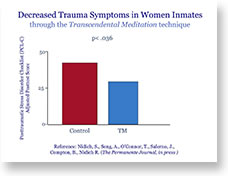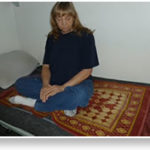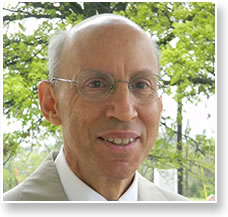
The practice of the Transcendental Meditation program for four months significantly reduced trauma symptoms in female prisoners

Inmates at the Coffee Creek Correctional Facility in Wilsonville, Oregon, practicing the Transcendental Meditation technique

An inmate at the Coffee Creek Correctional Facility in Wilsonville, Oregon, sitting on her bed for her twice-a-day practice of the TM technique

Sanford Nidich, lead author of the study
A new randomized controlled study by MUM researchers on 22 female prisoners, published in The Permanente Journal, found that those practicing the Transcendental Meditation® technique for four months had significant reductions in total trauma symptoms compared with a control group. This is the first stress study focused specifically on female prison inmates with high levels of trauma symptoms.
A similar study in the same journal last October involving 181 male prisoners found a 47 percent reduction in total trauma symptoms, including anxiety, depression, dissociation, and sleep disturbance, and a significant decrease in perceived stress, compared to a non-meditating control group.
The two studies were led by Sanford Nidich, EdD, director of the Center for Social Emotional Health and Consciousness at MUM. “This study is a valuable addition to the research literature in women’s mental health, showing a natural and effortless alternative approach to reducing trauma symptoms,” said Dr. Nidich. “Previous studies have shown reduced trauma with the TM program in other populations, including veterans and African refugees.”
Surveys have shown that prisoners have one of the highest rates of lifetime trauma of any segment of society, with 85 percent having been a victim of a crime-related event, such as robbery or home invasion, or physical or sexual abuse. Trauma is associated with higher rates of recidivism and mental and physical health conditions, including cardiovascular disease.
The subjects in the study were encouraged to practice the Transcendental Meditation technique individually in their prison cells twice daily and encouraged to attend group meditation sessions, supervised by a teacher of the Transcendental Meditation technique, twice a week over the four-month study period. Those practicing the Transcendental Meditation technique said they felt a lot better—less stressed along with a greater sense of inner freedom and resilience.
“Meditating twice a day has helped lessen my stress levels, allowed me to connect to and center myself at deeper levels, and to retreat, reflect, and problem solve,” said one subject. “Meditating helps facilitate my mental clarity, while at the same time calming me.”
Other MUM authors include Randi Nidich, EdD, and John Salerno, PhD, senior researchers at the MUM Center for Social Emotional Health and Consciousness, and alumna Angela Seng.
